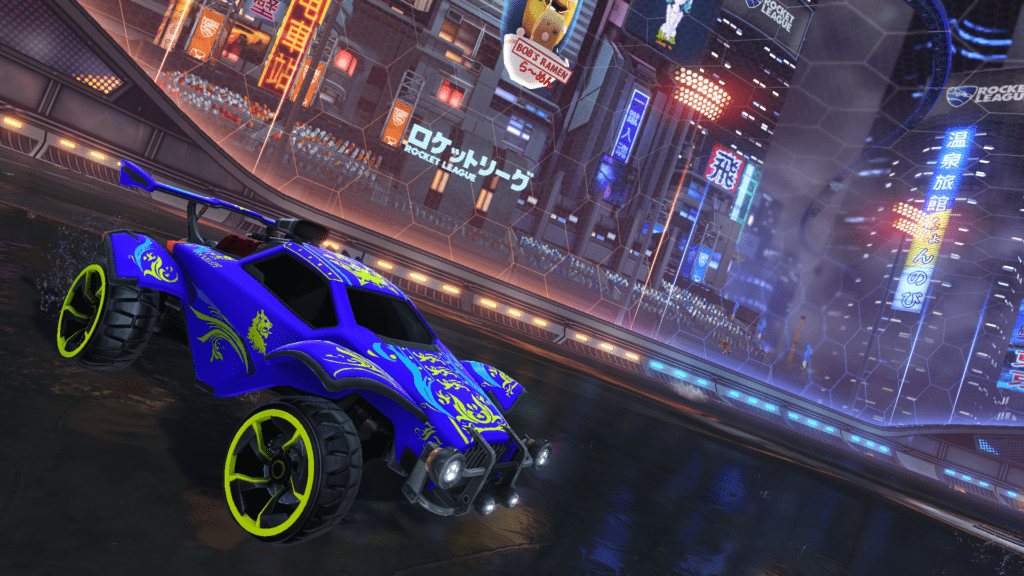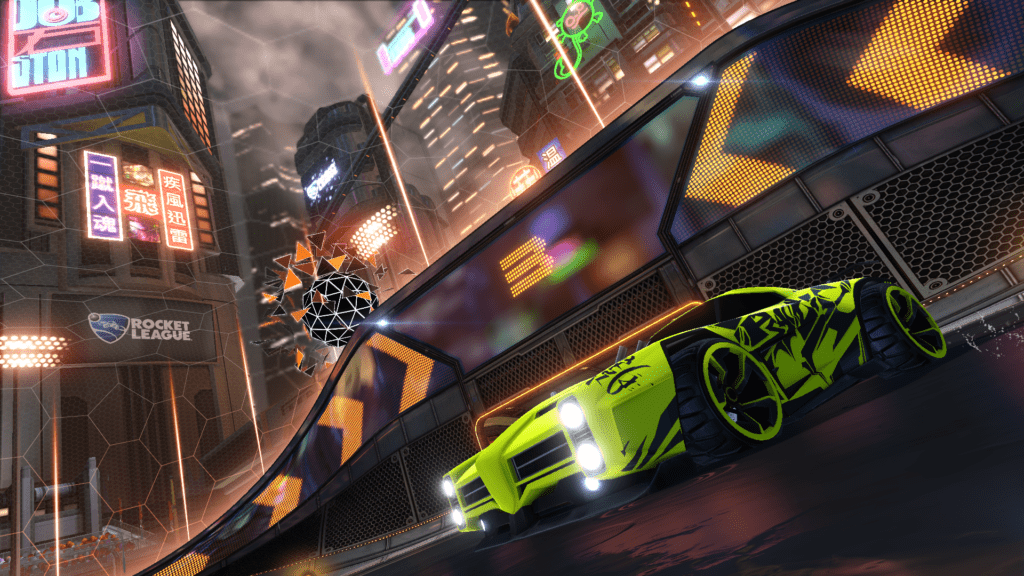By match number one thousand, the art of anticipating the flight of the ball and manoeuvring my car to meet its trajectory still alluded me. Now, nearing a milestone four-thousandth Rocket League exhibition across the various pantheons of Rumble, Hockey, Doubles, Dropshot, Hoops, Chaos and the inimitable Solo Standard, hitting the ball is no longer a problem – consistency is.
For a while, I wasn’t sure why I kept coming back to Rocket League. I sensed no tangible improvement to my level of skill, and regularly succumbed to defeats in which opponents had overcome my hapless fumbling around the field with their own graceful, effortless gliding through the air above me. Couldn’t manage to get off the ground without losing control of the car, let alone direct the ball towards the goal, wheels still spinning as I left the pitch in my wake. Though, even via a series of damnably improbable mistakes, the execution of something unexpectedly spectacular made up for all of the mediocrity in the meantime. And for somebody thousands of matches deep into an otherwise uneventful Rocket League career, it’s those moments that make the game the splendidly playable phenomenon that it is. And I think that’s why I continue to play, even as consistency alludes me. For it’s in brief and regularly insignificant flashes that Rocket League strives to make champions of its challengers.
Even the most unremarkable Rocket League prospect can become a match winner, and therein lies the appeal that has captivated millions of players across all platforms. Sure, there will be matches in which your team will fall to a three goal deficit before half a minute has ticked by, one by one each throwing in the towel and disappearing from the game in a fizzle of electric discharge. Like in the sport itself, there’s sometimes no avoiding being on the wrong side of a relentless drubbing. But again, like in football as in Rocket League, the result is rarely a foregone conclusion. The impossible is simply the improbable here, as it should be.
Rocket League is the kind of game that I can lose hours to coasting through a Spotify playlist, steadily pacing myself across handfuls of fixtures as the evening ticks over and the shuffle feature wears itself down. Though most of my minutes with the game have been spent instead as part of a trio or a quartet, with the recognisable sounds of my music library traded for the guffaws and hollers that accompany every goal-line clearance and last-gasp winner. We’ve spent a lot of time playing together, and it’s with a similar self-deprecating nature that each of my regular teammates readily curse their lack of skilfulness and apparent technical amateurism. One of us in particular even revels in his knack of scoring own goals, all of which come as a result of desperation defending, a slow moving ball edging gradually towards the net not an easy clear, but more of a poison chalice.
Beneath it all, even if your mistake is met with a derogatory ‘What a save!’ emanating from the opposition half of the chat feed as you fumble a defensive block, or your own team barraging you with ‘Wow!’ up until they’re hit with a forced cool-down, there’s at least the occasional sense of mutual understanding between the red side of things and the blue. The insults fly freely in Rocket League at the best of times – making six saves in a game was enough to incite a particularly lengthy PlayStation chat session with one disgruntled player. Accidentally clipping the tail of a teammate as he lunged for the ball enough to have death wished upon myself and my family on another occasion. The bemusement that comes from being on the wrong end of this sort of textual gore is even more surprising when it turns out that the instigator is languishing far from the top of the leaderboard. You get it when you win, when you lose. Muting the chat is a safe option when it comes to distancing yourself from the growing swathes of acid-spitting nomads that play the chat game with a lot more passion than the actual game at hand, hopping between match lobbies in order to curse and accuse.
Though there are those moments beyond the bile that alleviate some of the tension surrounding the pursuit of wins in a game so quick to punish you. Rocket League derives its inherent challenge from a control scheme that is initially difficult to rein in, and even more so to mould into something resembling a cultured personal play-style. And it’s here where frustration begins to build, where Rocket League’s individuality as a game dependant on the fashioning of raw ability into solid, technical prowess leaves many of its players left to fight the tide without really knowing how. Only after that point does the successful anticipation of the flight of the ball begin to make sense. Only then does the genuine “Good game lads” in the chat at the end of a match allow for an understanding of your own personal improvement. Maybe the occasional MVP award isn’t so bad, either.
It’s no surprise that with such a unique and outright accessible structure, Rocket League has ascended to eSports stardom – a welcome byproduct of its seemingly perpetual evolution. From PlayStation Plus exclusivity, to all other available platforms culminating in the Nintendo Switch edition. To physical copies lining shelves, merchandise and optional micro-transaction purchases allowing for a consistent, unhindered stream of revenue. Rocket League, the game built of equal parts frustration and persistence, success and failure, has carved out its own essential status, Psyonix Studios undoubtedly watching their creation soar with abundant pride.
And though I began this article by writing myself off, it’s the catering to all skill levels and all player styles that’s as much to revere when it comes to Rocket League’s continually impressive concurrent player-base. Whole communities exist outside the game dedicated to honing pinch-shots, and learning how to execute a quick kick-off routine in order to give players a competitive advantage. Others sprouted up as a trading scene blossomed, many content to pursue collectible items and eke value out of an impressive community driven economy based around trading Rocket League customisation parts. But these two poles of a broad and diverse community landscape are met in the middle by an even larger section of the populace not at all interested in trading for matching car setups or watching video tutorials on how to control a wayward spin of the tail.
For those that just want to play because scoring goals and making saves is tremendous fun, the game’s core dynamic still shines brighter than any of its other, many accomplishments. And I think that’s why I keep coming back to Rocket League – though it may reach greater and greater heights with each passing year, the prospect of hurtling around the ball and bemoaning my luck with a few friends is one that hasn’t lost its lustre. For us, that’s more than enough.

